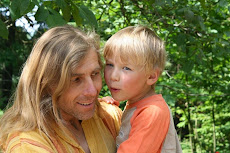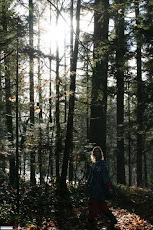Living Big is an extreme sport. There's a danger in being so open, in letting myself bubble up and over so freely. Last weekend I was flowing, funny, Very Out-There, and woke up the next morning with that familiar What Did I Do Last Night hangover.
The parents association made the brave decision to appoint me as Jester in the annual MayFair celebration. Always up for a new role - especially an undefined one like that - I donned my Shakespearean garb from a Y2K Amsterdam garage sale, an African trumpet made from 2 brightly-painted bull horns, and an edgy, bawdy Monty-Python comedic posture.
The boys kept asking what I was going to do to be funny, and I answered that I didn't know until we got there. It wasn't something that could be rehearsed, it just had to come out somehow. Being funny is intimidating - I couldn't expect to memorize 4 hours worth of one-liners and fall-down gags. I just trusted that something mirthful would emerge, like when we arrived and I instinctively cycled right into the outdoor dining area, wobbling and crashing into tables shouting at my imaginary horse. The comedic gauntlet had been thrown.
And flow it did. The whole day was pure fun, a chance to play with friends old and young, to lightly and cleverly and cunningly tickle and delight and even shock. I played with the edge between magical and worldly, listening to one-liners jump out of my mouth that floated over the innocent minds while "busting the guts" of the adults. When I repeatedly couldn't coax a noise out of my bull-horn and a fellow dad then blasted a pure powerful tone, I blurted out, "Just goes to show that it isn't the horn, it's how you blow it."
Now for the hangover. The problem with playing on the edge is that, almost by definition, you fall to the other side sometimes. In the sobering waters of the hot tub that night, the gentle stars and my wise wife reflected back some moments that were inappropriate in the family-day context. The pure high of a day of fanciful jest and appreciative laughter was swept away in the recollection of jokes that I would have held back given a second chance.
"But there is no second chance in improv," I protested. There's precious little time for self-monitoring and filtering as jokes and jests erupt in the spontaneous, reactive flow that makes them funny. I'm nowhere good or experienced enough at this to be free and flowing and funny if I have to hold back and check-in before every comment.
"Did anyone ask you to do stand-up comedy?" was Sarah's gentle reply. Hmmm, I had to settle back down in the frothy hot-tub waters to let that one wash over. I was asked to be Jester, with the interpretation left up to me. It was me who chose the sharp Monty Python humour, the bawdy British edge, and the historical Speak-the-Unspeakable function of the true jesters of old. I played it well and for the most part got it right, but was it the right role to play?
Not only was this a family event, where comments about eager brides might be better saved for the parents-only Who Knew night, but it was a Waldorf festival. This education system we've chosen and deeply believe in goes to great lengths to preserve the innocence of childhood, to let them live in a magical and imaginative and creative, good world for as long as possible. They'll join us in the big raw corporate dangerous high-tech media-laden brand-name consumer-driven world soon enough - for now, we let them be children. In my noble quest for jest, I didn't always keep that principle in front of me.
But beyond inappropriate jokes and anachronistic playacting, the biggest cause of my week-long funk was the repeat of a life-long pattern of going too far. Starting way back in grade 12, my girlfriend would help me analyze each party the next morning, where I'd been too loud, too in-your-face, too forward, too attention-seeking, too disrespecting of the group or the situation. Over the decades I've learned to channel a very genuine abundance of energy and freedom in appropriate venues and volume levels, while inwardly enjoying an even fuller and raunchier and more outrageous litany of comments and actions that y'all would never even guess at. I don't live smaller, just am careful about when and how and with whom to express it all.
So the biggest personal disappointment of Mayfest was the all-too-familiar malfunction of this filter that lets me enjoy and be enjoyed by the precious community and world around me. I'm very aware that it wasn't as catastrophic as this long exploration and week-long cloud would suggest, but after a quarter century of learning to look before my enthusiastic leap it's disheartening to realize that I landed right back in Grade 12 Social Ethics class.
After a week of roller-coaster emotions, including serious doubts about my fit and role in the Waldorf world, I'm being a bit more forgiving of myself. Maybe I was just being the outrageous Me that people love, even respect, and perhaps occasionally need. Maybe I hit it just right: that historic role of the Jester who can and must say the things to the King that the populace feels but can't express. And maybe I just took another important backward step into understanding and embracing my place in the Waldorf community.
Ending on a positive note, I'm deeply grateful to the legion of friends and smiling parking-lot parents who are still thanking me for my contribution to the event, and who have held and supported me in these ponderings. Whatever self-flagellation I feel necessary, I feel very loved and appreciated by the beautiful people around me. One friend spontaneously what I've been trying to hold onto:
I was sorry to see you look a bit down today about your Jester role at the May Day event. I am reading a wonderful book about Waldorf education right now and realize how the form, unspoken rules and aesthetic of our school is less important than the spirit that lies underneath. To that end, you are a bright light, a much needed Fool, in the deck of tired archetypes. You are a blessing to us all. You are not too much. You are just right. I hold you in that light as you process through your efforts which sustain us all.
I'm not too much. I do sometimes express too much of that abundant Me for the people and situations around me, but I'm not too much. I'm just me - a whole lotta me - and sharing that is my gift. Even if sometimes I end up feeling like the Fool.





